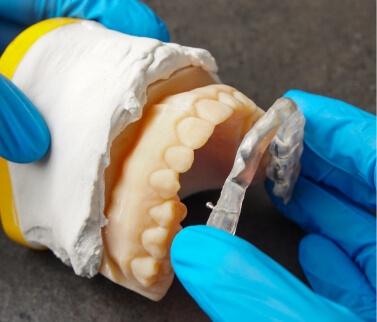TMJ Treatment Worcester
Putting an End to Jaw Pain

To be honest, dentistry doesn't just focus on teeth and gums. It also tries to make sure your jawbone is doing well. When you feel pain in your jaw, there's a good chance you have TMJ disorder. The latter can cause (and stem from) varied oral health risks. Therefore, our office is ready and offers great TMJ treatment in Worcester. Please keep reading to learn about it or book a visit to our office soon.
Why Choose Burncoat Family Dental for TMJ Treatment?
- Highly Experienced Dental Team
- Custom Appliances Designed to Last
- Advanced Technology & Financing Options
Symptoms of TMJ Disorder

Unlike what you may think, a jaw issue isn’t always harmless. It may be that you’re suffering from TMJ disorder. This condition refers to problems that can affect your jaw joints.
The signs of TMJ disorder vary widely over time. The most common of them are:
- Persistent jaw pain
- Jaw popping or clicking
- Difficulty opening or closing the mouth
- Headaches and/or migraines
- Changes in how your teeth align
- Ringing in your ears (i.e., tinnitus)
- Earaches
TMJ Treatment Options

During the consultation visit, our dental team will closely assess your jaw and mouth. We may even take dental X-rays or CBCT images as part of the process. Afterward, we’ll review our findings and consider the best available options.
Our practice has two ways to treat TMJ disorder. The first is equilibration, a method also known as occlusal adjustment. Our second method is a device called an occlusal splint. Which of these two approaches best suits you will depend on your case.
Equilibration / Occlusal Adjustments

When a TMJ disorder is due to an alignment issue, we suggest equilibration. This method amounts to a series of changes to your bite. By reshaping your teeth, it allows your top and bottom arches to fit together well. Your jaw's joints will then be under less pressure and feel less pain.
Occlusal Splints

If your TMJ symptoms are a result of teeth grinding, we can give you an occlusal splint. This device is a mouthguard that reduces your jaw’s motion while you sleep. (It can also move your jaw slightly forward.) By wearing it at night, your TMJ and its surrounding muscles can relax more. You’ll then have fewer symptoms.
